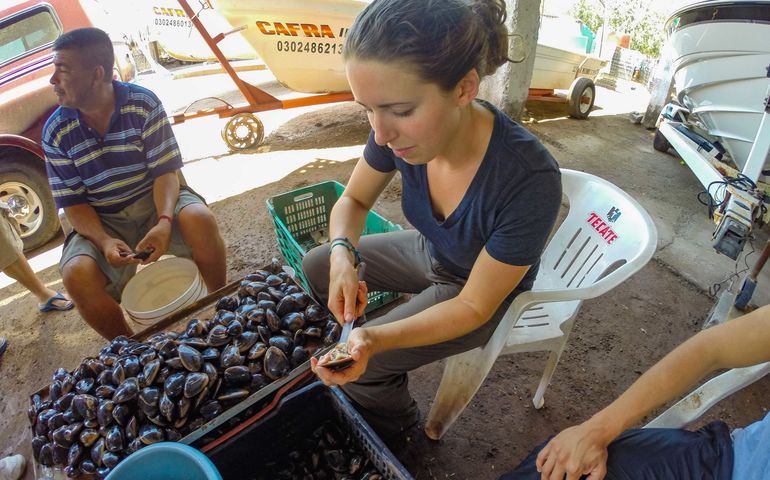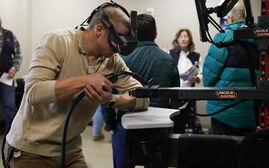Study: Maine's lobster co-management system offers lessons for other fisheries
 Courtesy / Santiago Domínguez Sánchez
Kara Pellowe, formerly based at the Darling Marine Center in Walpole, conducted fisheries research in Mexico alongside clam harvesters.
Courtesy / Santiago Domínguez Sánchez
Kara Pellowe, formerly based at the Darling Marine Center in Walpole, conducted fisheries research in Mexico alongside clam harvesters.
In the 1990s, Maine’s lobster industry and state regulators developed a co-management system that established seven lobster fishing councils, comprised of local fishermen, to oversee fishing practices in seven zones along the coast.
The system was designed to integrate the knowledge of local fishermen to help manage certain aspects of the fishery, as an alternative to top-down management by government regulators.
That model has lessons for fisheries beyond Maine, according to a new study by University of Maine conservation scientists.
“The Maine lobster fishery is a great example of how individual harbors can have localized control over managing fishing areas and over deciding on fishing practices in their local area,” UMaine researcher Kara Pellowe told Mainebiz. “In the 1990s, that was formalized as Maine’s lobster zones. How Maine manages lobsters has, over time, reflected increasing alignment between formal and informal rules.”
‘Hookah’ diving
During the five-year study, Pellowe and her colleague, Heather Leslie, looked at the formal, top-down institutions that currently control a Mexican small-scale fishery for a shellfish called “chocolate clams” (Megapitaria squalida). They also observed the informal practices, based on local fishermen’s understanding of the fishery, that traditionally take place but aren’t accounted for in the formal management plan.
The interplay between formal institutions and informal practices signals the potential for a co-management system in the fishery, Pellowe said.
An example of an informal practice in the chocolate clam fishery is the practice of free diving, which local fishermen see as being ecologically preferable.
“However, currently there are only permits available for diving with a gasoline-powered air compressor, which is called ‘hookah diving,‘” she said. “There needs to be a way for people to obtain a permit for free diving. Currently, free divers operate illegally. That has really caused a lot of community distrust in fisheries management.”
The study concluded that integrating local norms and fishermen’s knowledge into fisheries regulations helps increase trust in fisheries management institutions and can make it easier for co-management to work.
Their findings were recently published in the peer-reviewed scientific journal Marine Policy.
Pellowe, a former UMaine postdoctoral student formerly based at the Darling Marine Center in Walpole, is now studying reef ecosystems at the Stockholm Resilience Centre in Sweden. Leslie is director of the Darling Marine Center.
From 2014–20, Pellowe regularly traveled to Baja California Sur, Mexico, to work closely with fishermen, managers and stakeholders in the Mexican chocolate clam fishery in Loreto Bay National Park, on the Baja peninsula.
Her methods included a mix of participatory observation, ethnographic conversations and interviews.
“What that means was I was having conversations with fishermen, going out with them on their boats to observe them harvesting clams — including diving with them — going back to shore with them, helping them process and clean their catch and, in some cases, taking part in preparing their clams for sale. I was embedded in the fishing community for one to three months per year for five years.”
She picked that fishery to study because of its value to the local economy.
“It’s one of the top species harvested, by biomass and value, in the Mexican state of Baja California Sur,” she said. “But like many fisheries in that region, there’s very little known about its biology, so the fishery is being managed with fairly limited data.”
Her initial work sought to understand the clam’s biology.
“Then, through my interaction with fishermen, I realized there was a much deeper, more complex social and political context in which people are actually interacting with this species,” she said. “It was over the course of several years that some of the big themes started to jump out at me.”
The study seeks to illustrate the potential opportunities and roadblocks for co-managing the fishery.
“Maine has shown it’s possible to do this and that it doesn’t necessarily require a major restructuring of power in order to integrate local norms into formal fisheries regulations,” she said.
Maine’s soft-shell clam fishery is another example of co-management, because municipalities manage the resource in coordination with the state, she explained. That co-management system takes into account the potential for local differences in rule-making and harvesting.
“I think that highlighting the value of explicitly drawing out local norms and increasing engagement of shellfish committees with local harvesters directly links to the findings from our paper,” she said.













0 Comments